Berenson O’Brien
Levine
Szabat
Jayne
Watson
Basic
BUSINESS
Business
Statistics
Concepts and Applications
4TH EDITION
Copyright © Pearson Australia (a division of Pearson Australia Group Pty Ltd) 2016—9781486018956—Berenson/Basic Business Statistics 4e�
Basic
Business
Statistics
Concepts and Applications
4TH EDITION
Copyright © Pearson Australia (a division of Pearson Australia Group Pty Ltd) 2016—9781486018956—Berenson/Basic Business Statistics 4e�
This page intentionally left blank.This page intentionally left blank.�
BUSINESS
Basic
Business
Statistics
Concepts and Applications
4TH EDITION
Berenson Levine Szabat O’Brien Jayne Watson
Copyright © Pearson Australia (a division of Pearson Australia Group Pty Ltd) 2016—9781486018956—Berenson/Basic Business Statistics 4e�
Copyright © Pearson Australia (a division of Pearson Australia Group Pty Ltd) 2016
Pearson Australia
707 Collins Street
Melbourne VIC 3008
www.pearson.com.au
Authorised adaptation from the United States edition entitled Basic Business Statistics, 13th edition, ISBN 0321870026 by Berenson,
Mark L.; Levine, David M.; Szabat, Kathryn A., published by Pearson Education, Inc., Copyright © 2015.
Fourth adaptation edition published by Pearson Australia Group Pty Ltd, Copyright © 2016
The Copyright Act 1968 of Australia allows a maximum of one chapter or 10% of this book, whichever is the greater, to be copied by any
educational institution for its educational purposes provided that that educational institution (or the body that administers it) has given a
remuneration notice to Copyright Agency Limited (CAL) under the Act. For details of the CAL licence for educational institutions contact:
Copyright Agency Limited, telephone: (02) 9394 7600, email: info@copyright.com.au
All rights reserved. Except under the conditions described in the Copyright Act 1968 of Australia and subsequent amendments, no part of
this publication may be reproduced, stored in a retrieval system or transmitted in any form or by any means, electronic, mechanical,
photocopying, recording or otherwise, without the prior permission of the copyright owner.
Senior Learning Architect: Joanne Hobson
Development Editor: Anna Carter
Senior Project Manager: Sandra Goodall
Digital Product Developer: Erin Nixon
Digital Content Developer: Udarie Fernando
Copyright and Pictures Editor: Kim Morgan
Copy Editor: Julie Ganner
Proofreader: Katie Millar
Indexer: Garry Cousins
Cover and internal design by Liz Nicholson, design BITE Pty Ltd
Cover photograph © Raw Pixel/Shutterstock.com
Typeset by iEnergizer Aptara®, Ltd
Printed in China
1 2 3 4 5 20 19 18 17 16
National Library of Australia
Cataloguing-in-Publication Data
Berenson, Mark L., author.
Basic business statistics : concepts and applications /
Mark L. Berenson, David M. Levine,Kathryn A. Szabat,
Martin O’Brien,Nicola Jayne, Judith Watson.
4th edition
9781486018956 (paperback)
9781486019410 (Vital Source)
Includes index.
Commercial statistics.
Business mathematics.
Statistics.
Creator:
Title:
Edition:
ISBN:
ISBN:
Notes:
Subjects:
Other Creators/Contributors:
Dewey Number: 519.5
Levine, David M., 1946– author.
Szabat, Kathryn A., author.
O’Brien, Martin, author.
Jayne, Nicola, author.
Watson, Judith, 1956– author.
Every effort has been made to trace and acknowledge copyright. However, should any infringement have occurred, the publishers tender
their apologies and invite copyright owners to contact them.
Copyright © Pearson Australia (a division of Pearson Australia Group Pty Ltd) 2016—9781486018956—Berenson/Basic Business Statistics 4e�
brief contents
Preface
Acknowledgements
How to use this book
About the authors
PART 1
PRESENTING AND DESCRIBING INFORMATION
Introduction and data collection
1
2 Presenting data in tables and charts
3 Numerical descriptive measures
PART 2 MEASURING UNCERTAINTY
4 Basic probability
5 Some important discrete probability distributions
6 The normal distribution and other continuous distributions
7 Sampling distributions
PART 3
DRAWING CONCLUSIONS ABOUT POPULATIONS BASED
ONLY ON SAMPLE INFORMATION
8 Confidence interval estimation
9 Fundamentals of hypothesis testing: One-sample tests
10 Hypothesis testing: Two-sample tests
11 Analysis of variance
x
xi
xii
xvii
2
20
58
111
141
171
204
243
278
320
360
PART 4
DETERMINING CAUSE AND MAKING RELIABLE FORECASTS
12 Simple linear regression
13 Introduction to multiple regression
14 Time-series forecasting and index numbers
15 Chi-square tests
410
459
499
564
PART 5
FURTHER TOPICS IN STATS
608
16 Multiple regression model building
17 Decision making
635
18 Statistical applications in quality and productivity management 659
693
19 Further non-parametric tests
Appendices A to F
Glossary
Index
A-1
G-1
I-1
Copyright © Pearson Australia (a division of Pearson Australia Group Pty Ltd) 2016—9781486018956—Berenson/Basic Business Statistics 4e�
detailed contents
PA R T 1
PRESENTING AND DESCRIBING
INFORMATION
1 Introduction and data collection
1.1 Basic concepts of statistics
1.2
The growth of statistics and information
technology
1.3 Collecting data
Types of variables
1.4
Summary
Key terms
Chapter review problems
Appendix 1 Introduction to using Microsoft
Windows and Excel
2 Presenting data in tables and charts
Tables and charts for categorical data
2.1
2.2 Organising numerical data
2.3
Tables and graphs for numerical data
2.4 Cross-tabulations
2.5 Scatter diagrams and time-series plots
2.6 Misusing graphs and ethical issues
Summary
Key terms
Chapter review problems
Appendix 2 Using statistical software for tables
and charts
3 Numerical descriptive measures
3.1 Measures of central tendency, variation
and shape
3.2 Numerical descriptive measures for a
population
3.3 Calculating numerical descriptive measures
from a frequency distribution
Five-number summary and box-and-whisker
plots
3.4
3.5 Covariance and the coefficient of correlation
3.6
Pitfalls in numerical descriptive measures
and ethical issues
Summary
Key formulas
Key terms
Chapter review problems
Appendix 3 Using statistical software for
descriptive statistics
End of Part 1 problems
PA R T 2
MEASURING UNCERTAINTY
4 Basic probability
4.1 Basic probability concepts
4.2 Conditional probability
4.3 Bayes’ theorem
4.4 Counting rules
Ethical issues and probability
4.5
Summary
Key formulas
Key terms
Chapter review problems
Appendix 4 Using statistical software for
basic probability
5 Some important discrete probability
distributions
5.1
Probability distribution for a discrete
random variable
5.2 Covariance and its application in finance
5.3 Binomial distribution
Poisson distribution
5.4
5.5 Hypergeometric distribution
5.6
(Online Topic) Using the poisson
distribution to approximate the binomial
distribution
Summary
Key formulas
Key terms
Chapter review problems
Appendix 5 Using statistical software for discrete
probability distributions
6 The normal distribution and other
continuous distributions
6.1 Continuous probability distributions
6.2
The normal distribution
99
99
101
103
111
112
120
127
132
136
137
137
137
138
140
141
142
146
150
157
161
164
165
165
166
166
168
171
172
173
2
3
5
6
8
11
12
12
13
20
21
26
29
38
42
45
49
50
50
53
58
59
80
85
87
90
96
97
97
Copyright © Pearson Australia (a division of Pearson Australia Group Pty Ltd) 2016—9781486018956—Berenson/Basic Business Statistics 4e�
188
192
194
197
200
200
200
201
202
204
205
205
215
218
223
227
227
228
228
230
232
243
244
6.3
6.4
6.5
6.6
Evaluating normality
The uniform distribution
The exponential distribution
The normal approximation to the binomial
distribution
Summary
Key formulas
Key terms
Chapter review problems
Appendix 6 Using statistical software for
continuous probability distributions
7 Sampling distributions
7.1 Sampling distributions
7.2 Sampling distribution of the mean
7.3 Sampling distribution of the proportion
7.4
Types of survey sampling methods
Evaluating survey worthiness
7.5
Summary
Key formulas
Key terms
Chapter review problems
Appendix 7 Using statistical software for
sampling distributions
End of Part 2 problems
PA R T 3
DRAWING CONCLUSIONS ABOUT
POPULATIONS BASED ONLY ON
SAMPLE INFORMATION
8 Confidence interval estimation
8.1 Confidence interval estimation for the mean
(σ known)
8.2 Confidence interval estimation for the mean
(σ unknown)
8.3 Confidence interval estimation for the
proportion
8.4 Determining sample size
8.5 Applications of confidence interval
estimation in auditing
8.6 More on confidence interval estimation
and ethical issues
Summary
Key formulas
Key terms
Chapter review problems
9.4
9.5
9.6
9.7
t test of hypothesis for the mean
(σ unknown)
Z test of hypothesis for the proportion
The power of a test
Potential hypothesis-testing pitfalls and
ethical issues
Summary
Key formulas
Key terms
Chapter review problems
Appendix 9 Using statistical software for
one-sample tests of hypothesis
10 Hypothesis testing: Two-sample tests
10.1 Comparing the means of two independent
populations
10.2 Comparing the means of two related
populations
10.3 F test for the difference between two
variances
10.4 Comparing two population proportions
Summary
Key formulas
Key terms
Chapter review problems
Appendix 10 Using statistical software for
two-sample tests
249
11 Analysis of variance
255
258
264
271
272
272
272
273
11.1 The completely randomised design:
One-way analysis of variance
11.2 The randomised block design
11.3 The factorial design: Two-way analysis
of variance
Summary
Key formulas
Key terms
Chapter review problems
Appendix 11 Using statistical software for ANOVA
End of Part 3 problems
Detailed Contents vii
Appendix 8 Using statistical software for
confidence intervals and sample size
determination
277
9 Fundamentals of hypothesis testing:
One-sample tests
9.1 Hypothesis-testing methodology
278
279
Z test of hypothesis for the mean (σ known) 285
292
9.3 One-tail tests
9.2
297
303
307
312
315
316
316
316
319
320
321
333
340
347
352
353
354
354
358
360
361
375
384
396
397
398
398
401
403
Copyright © Pearson Australia (a division of Pearson Australia Group Pty Ltd) 2016—9781486018956—Berenson/Basic Business Statistics 4e�
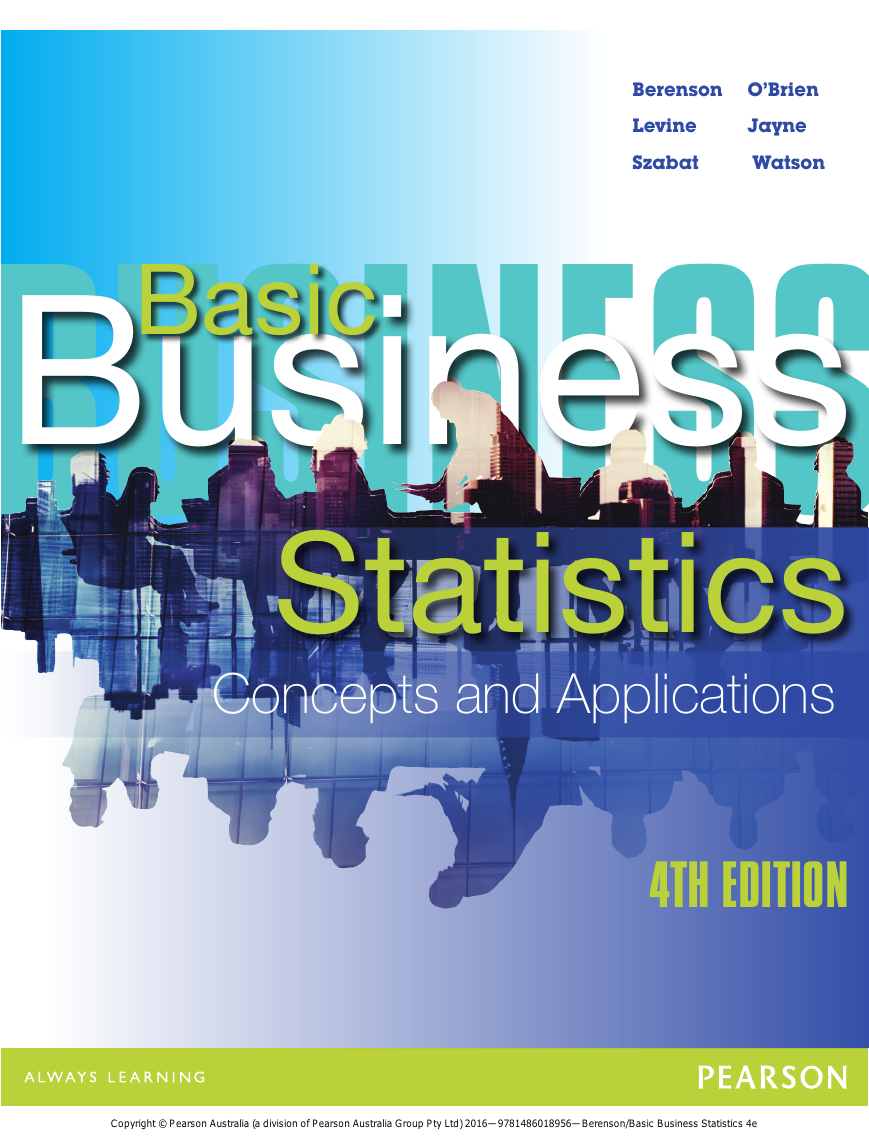
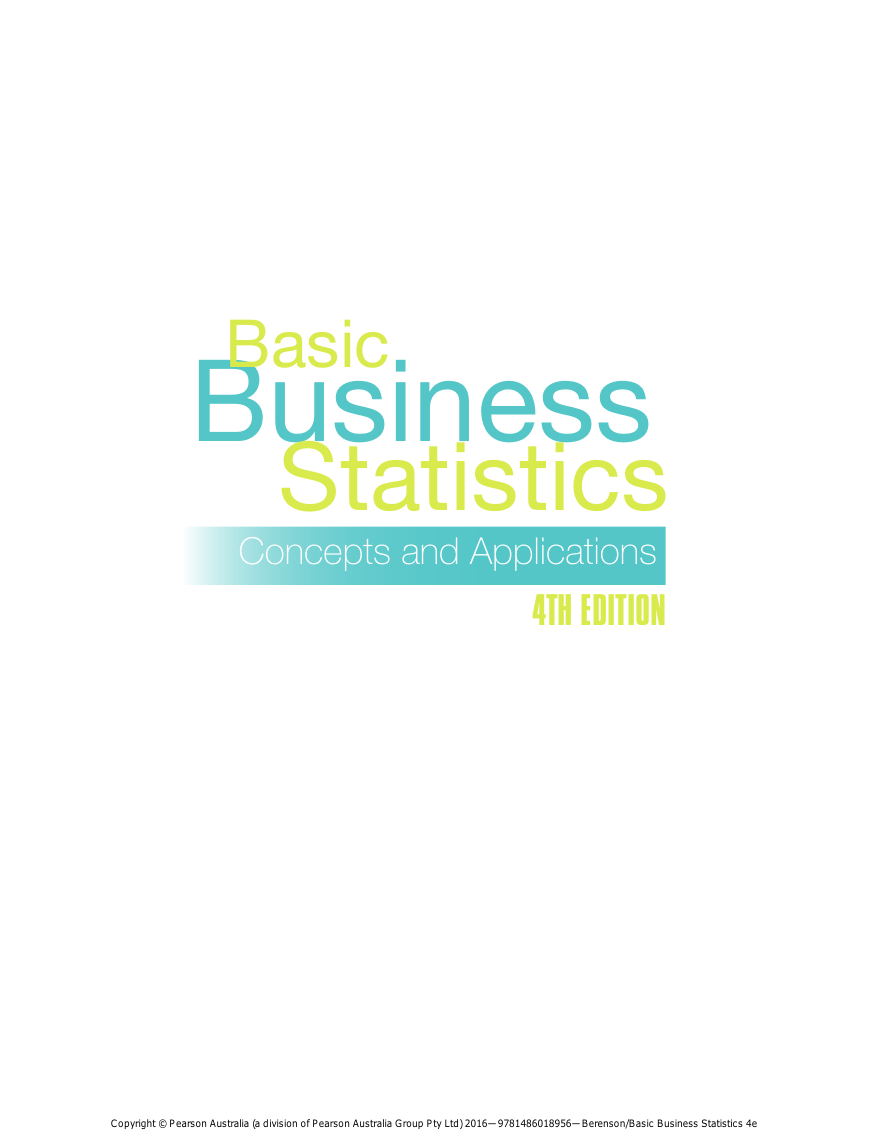

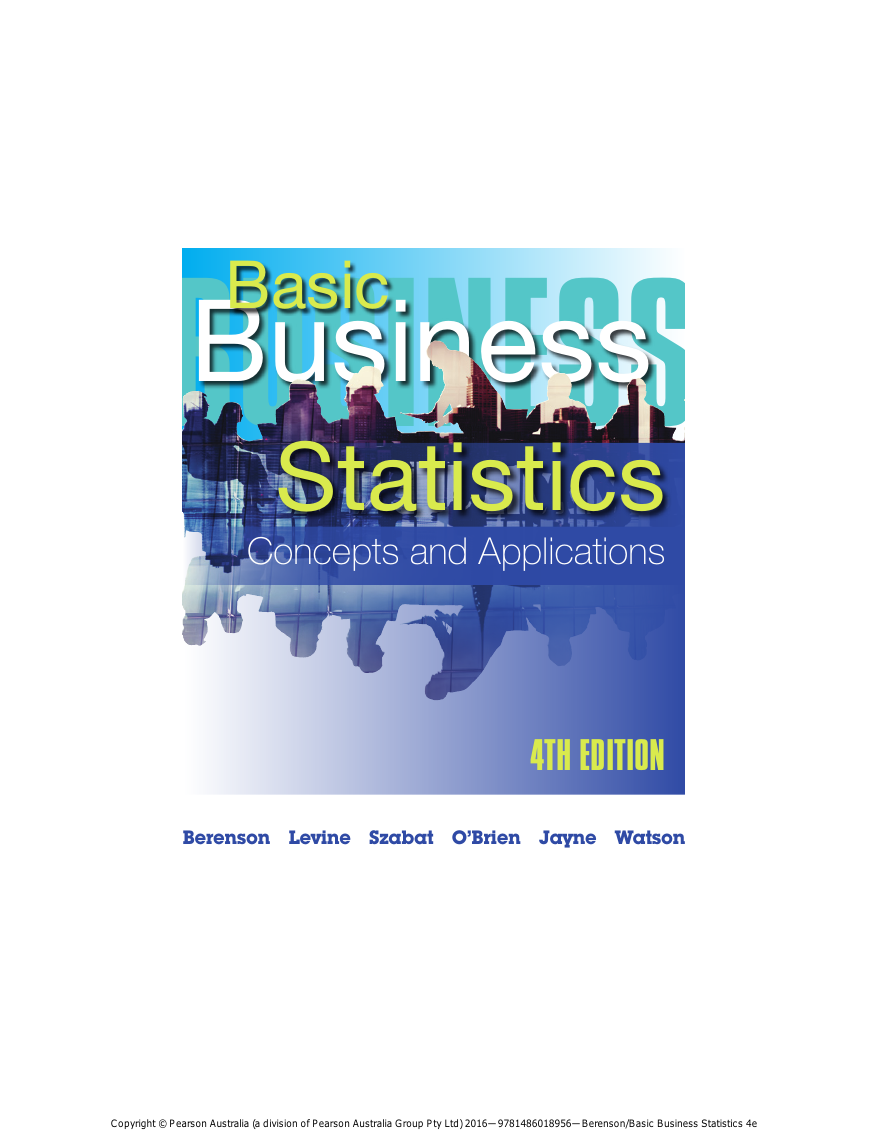
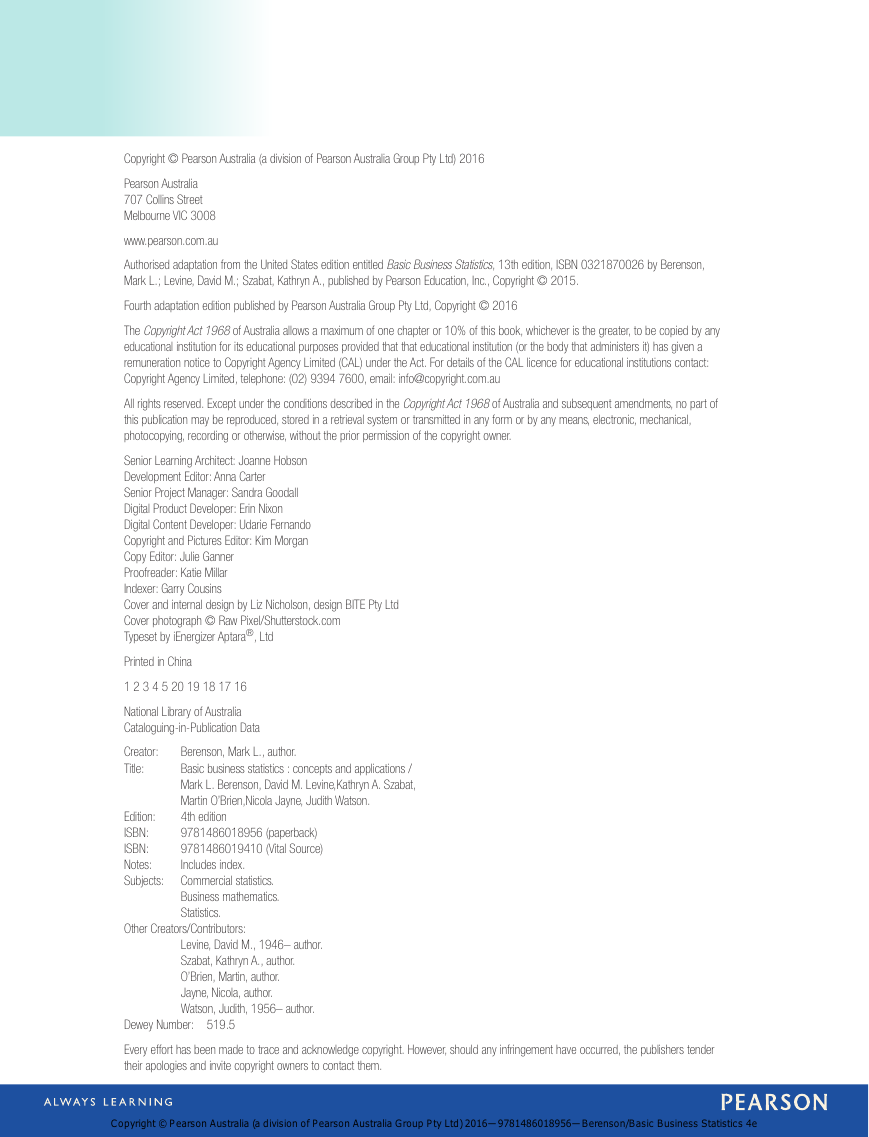
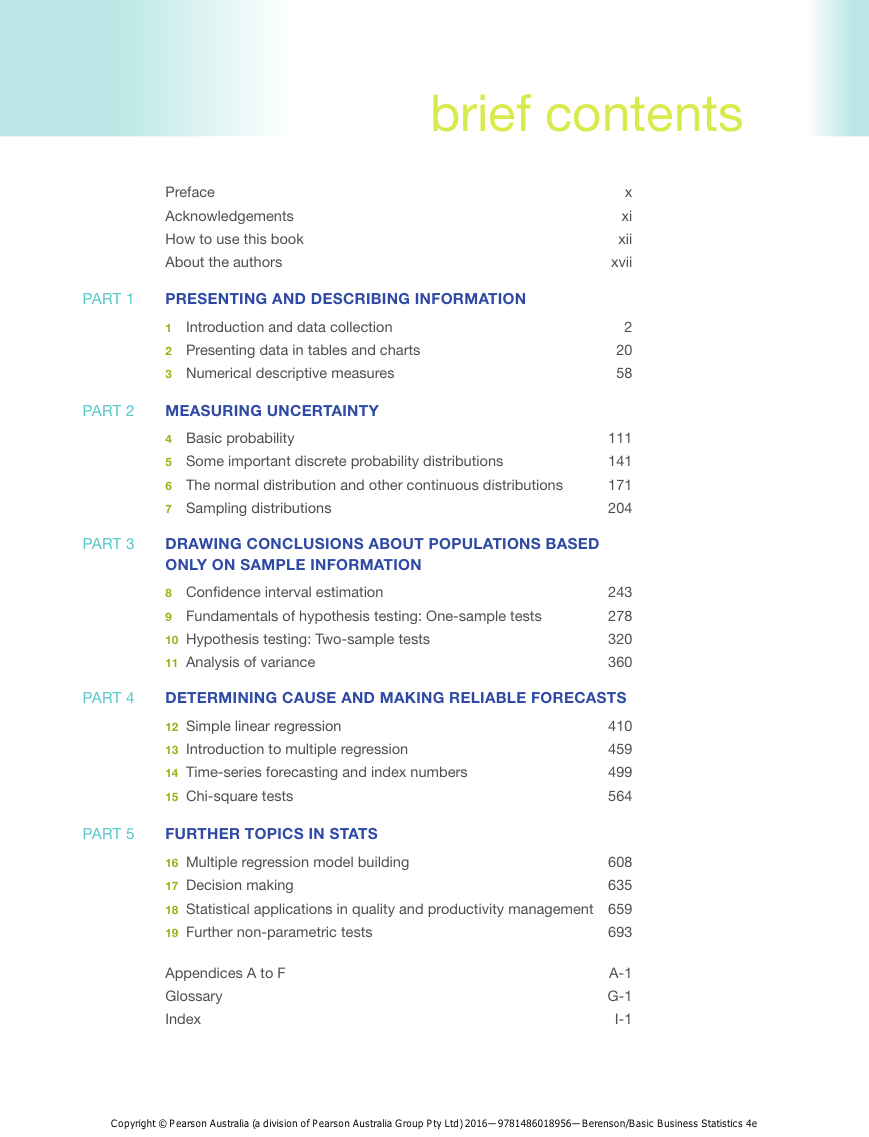
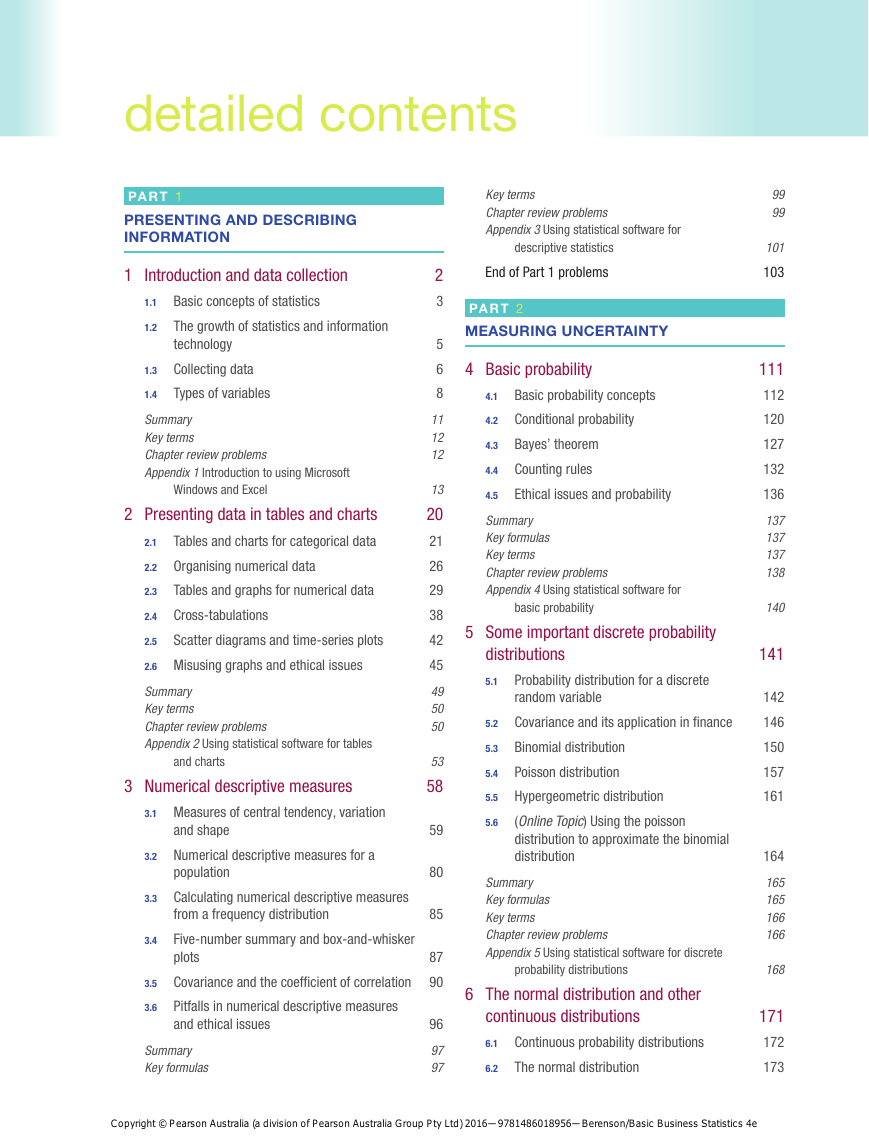
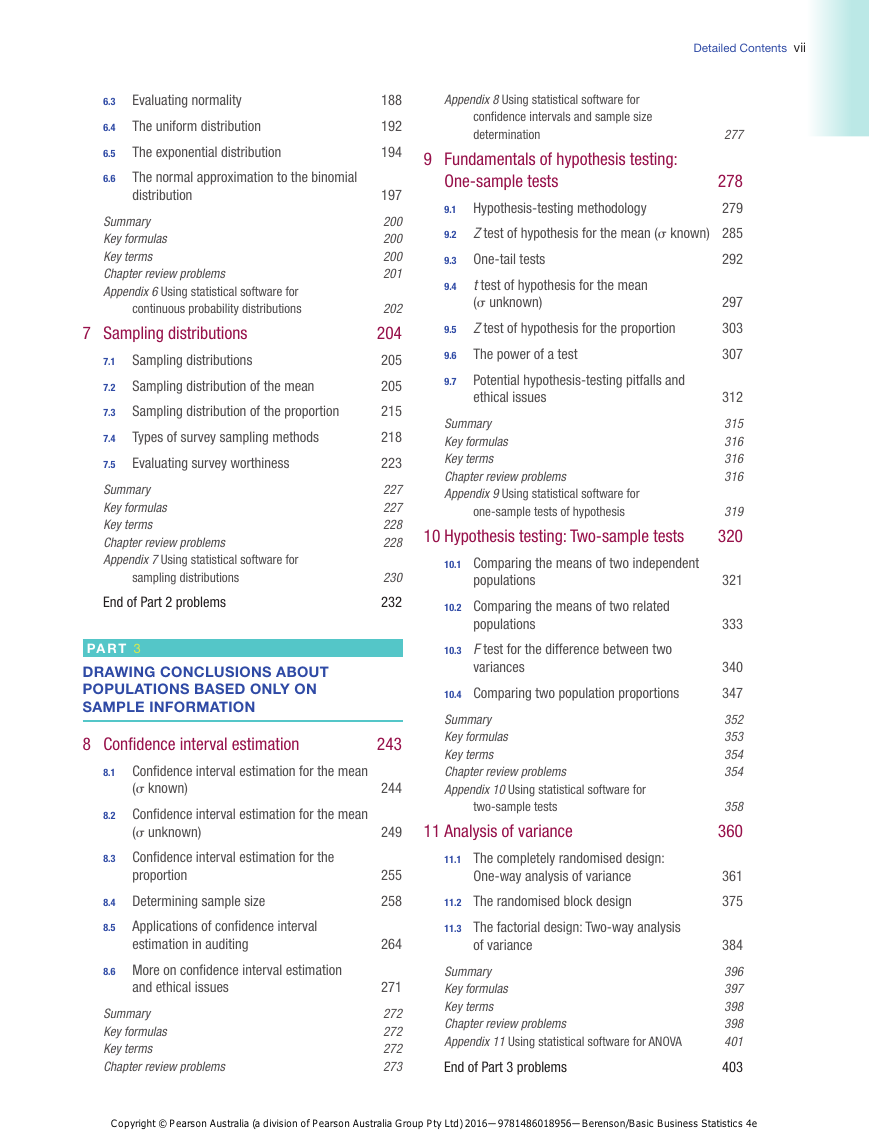








 2023年江西萍乡中考道德与法治真题及答案.doc
2023年江西萍乡中考道德与法治真题及答案.doc 2012年重庆南川中考生物真题及答案.doc
2012年重庆南川中考生物真题及答案.doc 2013年江西师范大学地理学综合及文艺理论基础考研真题.doc
2013年江西师范大学地理学综合及文艺理论基础考研真题.doc 2020年四川甘孜小升初语文真题及答案I卷.doc
2020年四川甘孜小升初语文真题及答案I卷.doc 2020年注册岩土工程师专业基础考试真题及答案.doc
2020年注册岩土工程师专业基础考试真题及答案.doc 2023-2024学年福建省厦门市九年级上学期数学月考试题及答案.doc
2023-2024学年福建省厦门市九年级上学期数学月考试题及答案.doc 2021-2022学年辽宁省沈阳市大东区九年级上学期语文期末试题及答案.doc
2021-2022学年辽宁省沈阳市大东区九年级上学期语文期末试题及答案.doc 2022-2023学年北京东城区初三第一学期物理期末试卷及答案.doc
2022-2023学年北京东城区初三第一学期物理期末试卷及答案.doc 2018上半年江西教师资格初中地理学科知识与教学能力真题及答案.doc
2018上半年江西教师资格初中地理学科知识与教学能力真题及答案.doc 2012年河北国家公务员申论考试真题及答案-省级.doc
2012年河北国家公务员申论考试真题及答案-省级.doc 2020-2021学年江苏省扬州市江都区邵樊片九年级上学期数学第一次质量检测试题及答案.doc
2020-2021学年江苏省扬州市江都区邵樊片九年级上学期数学第一次质量检测试题及答案.doc 2022下半年黑龙江教师资格证中学综合素质真题及答案.doc
2022下半年黑龙江教师资格证中学综合素质真题及答案.doc